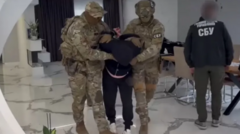In a display of military prowess, President Vladimir Putin will lead a massive Victory Day parade in Moscow on May 9, celebrating the 80th anniversary of the Soviet Union's victory over Nazi Germany. This event, featuring over 20 foreign dignitaries—including leaders from China and Brazil—highlights Russia's historical triumphs while reinforcing its narrative amidst the ongoing war in Ukraine. The parade is set to be the largest since the onset of the current Ukrainian conflict, and its observance by international leaders is seen as a significant political statement.
A Spectacle of Military Pride: Victory Day Parade in Moscow

A Spectacle of Military Pride: Victory Day Parade in Moscow
Amid ongoing tensions with Ukraine, Moscow holds a grand military parade celebrating historical victories.
The preparations for the parade include a parade of thousands of soldiers alongside various military vehicles, tanks, and nuclear missile launchers, with a special regiment of Chinese military personnel participating. Prominent fighter jets are also scheduled to fly over the city, further emphasizing the military focus of this year's celebration.
This year's parade takes on added significance as Russia's foreign relations come under scrutiny, especially in light of President Putin's recent announcement of a temporary cease-fire intended for the celebrations, which has been rejected by Ukrainian President Volodymyr Zelensky. The Ukrainian leader's refusal to accept security guarantees for attendees at the parade underscores the existing tensions. As military parades become symbols of national pride and international alliances, this event is expected to reshape perceptions of Russia on the global stage while reflecting the ongoing complexities of the Ukraine conflict.
This year's parade takes on added significance as Russia's foreign relations come under scrutiny, especially in light of President Putin's recent announcement of a temporary cease-fire intended for the celebrations, which has been rejected by Ukrainian President Volodymyr Zelensky. The Ukrainian leader's refusal to accept security guarantees for attendees at the parade underscores the existing tensions. As military parades become symbols of national pride and international alliances, this event is expected to reshape perceptions of Russia on the global stage while reflecting the ongoing complexities of the Ukraine conflict.




















